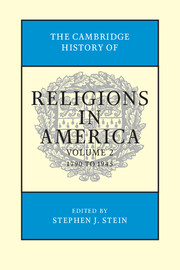Book contents
- Frontmatter
- Contents
- Contributors
- Editor's Introduction
- SECTION I RELIGION IN NORTH AMERICA
- 1 Religious Diversity in the 1790s
- 2 Religion and the Constitutional Tradition
- 3 Religion and Law in British North America, 1800–1867
- 4 Mexican American Faith Communities in the Southwest
- SECTION II RELIGIONS IN THE NEW NATION, 1790–1865
- SECTION III CHANGING RELIGIOUS REALITIES
- SECTION IV RELIGIOUS RESPONSES TO MODERN LIFE AND THOUGHT
- SECTION V COMPARATIVE ESSAYS
- SECTION VI RELIGION AND DIVERSE AREAS
- Index
- References
2 - Religion and the Constitutional Tradition
from SECTION I - RELIGION IN NORTH AMERICA
Published online by Cambridge University Press: 28 July 2012
- Frontmatter
- Contents
- Contributors
- Editor's Introduction
- SECTION I RELIGION IN NORTH AMERICA
- 1 Religious Diversity in the 1790s
- 2 Religion and the Constitutional Tradition
- 3 Religion and Law in British North America, 1800–1867
- 4 Mexican American Faith Communities in the Southwest
- SECTION II RELIGIONS IN THE NEW NATION, 1790–1865
- SECTION III CHANGING RELIGIOUS REALITIES
- SECTION IV RELIGIOUS RESPONSES TO MODERN LIFE AND THOUGHT
- SECTION V COMPARATIVE ESSAYS
- SECTION VI RELIGION AND DIVERSE AREAS
- Index
- References
Summary
Religion is woven into the fabric of the American political experiment. Since the first permanent settlements in British North America, religion has been integral to the identity and mission of the American people and their political pursuits. The New England Puritans especially endeavored, in the words of Matthew 5:14, to build a “city set upon a Hill.” Their polis, they believed, would remake political society and be a model for future commonwealths. Familiar features of colonial founding documents and other expressions of the colonists' political pursuits included invocations of divine blessing and acknowledgments of a sacred mission. Many early colonial charters and codes derived their ideas and provisions from the Bible. Most of the colonies eventually adopted a model of religious establishment they had known in the Old World. Local Puritan congregations enjoyed legal favor in much of New England – Rhode Island being the notable exception – and the Church of England was established throughout the South. Religious dissenters were afforded a measure of toleration in most colonies, although they were often burdened in the exercise of their religion and subjected to civil disabilities because of their religious beliefs and affiliations.
As European settlements grew in number and size up and down the Atlantic seaboard, there was a corresponding increase in the diversity of religious sects. The extraordinary religious diversity in the colonies was a potential source of rivalry and conflict among the sects competing for adherents and, sometimes, the legal and financial favor of the civil state.
- Type
- Chapter
- Information
- The Cambridge History of Religions in America , pp. 26 - 45Publisher: Cambridge University PressPrint publication year: 2000

